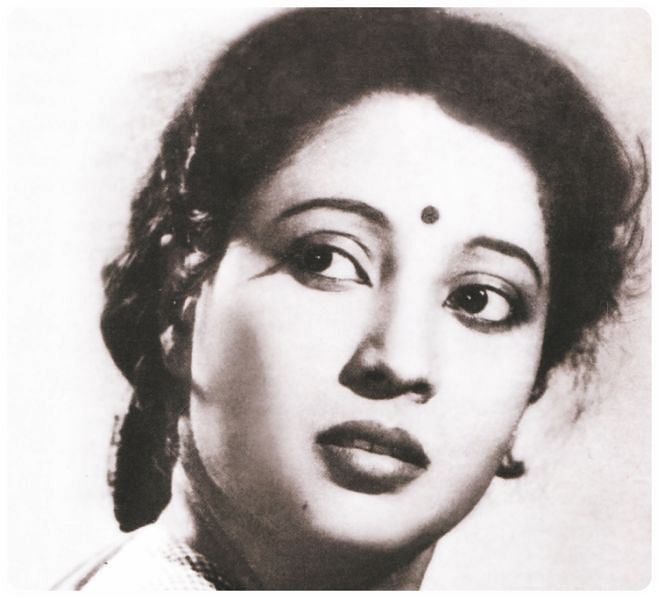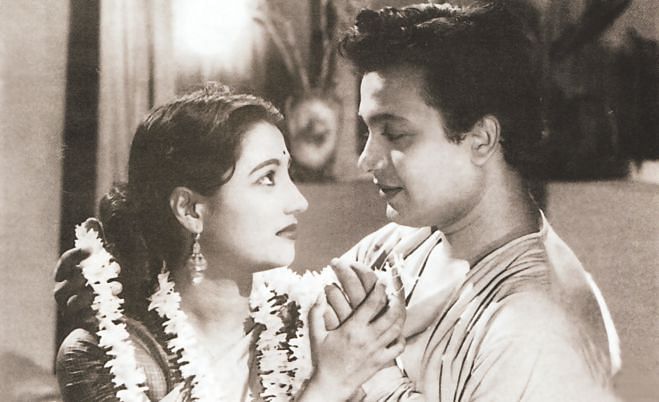SUCHITRA SEN

Great admiration of a graceful woman has been common in societies through the ages. In the Bengali speaking region Suchitra Sen in the prime of her beauty exercised a fascination that cause a flutter in every male heart. Folks of her time -- adolescent movie going boys and men in their prime and past their prime adored her quintessential grace of Bengali womanhood with overpowering fancy. Movie theatres buzzed with avid cine goers and movie going was a way of life because there was Suchitra; the lady with the tantalising gaze, her winsome features and her statuesque height. Her voice cast a spell-- and she walked in grace. Most of all her boundless histrionic talents were heightened by her personal charm. Her time is long gone and she has retired to self-imposed seclusion from the public eye; lest her charming image be tainted by the ravages of age. Her health is reported to be at a delicate stage at 82.
“Sesh Kothai" was her first film - it was never released. Her next film "Sare Chuattur" was released in 1952. The film was a box office hit and established Suchitra-Uttam as the most popular leading pair in Bengali cinema.
Her next popular film was “Agnipariksha” (1954) set in a new era of Bengali films with Suchitra Sen playing an important role. The days of staid leading ladies with outmoded dress and theatrical expression came to an end. Kanan Bala and Sandharani had served their time. A leading lady of Ingrid Bergman-esque western mould with a style of her own, using her features modulating her voice to spellbinding effect and endowed with histrionic talents of great endearment had appeared on the scene. Suchitra Sen changed Bengali cinema as nobody did; in the process adding standard to cinematic acting and special attraction to movie going. Madame Sen was on a pedestal in a Bengali movie. A height nobody yet scaled. There was nobody of her kind and there is nobody of her kind. Movie goers of her time still muse over the mesmerism of her cine persona. With the name Suchitra they drift in nostalgia.

So movie-goers flocked to theatres to gladden their hearts with the enchantment of watching Suchitra appear in grace, gaze in the most winsome fashion, speak in a delectable style -- melt the male lead with the most exquisite expression of love submitting to his arms with ardent love, comforting his head in her lap with assurance of love and the crystal tear drops glistening in her lovely eyes. So movie theatres were packed to capacity. They came out of the theatre lost in the thoughts of Suchitra's magic. Many of them came back time and again.
So a succession of Suchitra's mesmerism followed one after another - "Shapmochan (1955), "Sabar Upare (1955)", "Sagarika (1956)", "Shilpi (1956)", "Pothey holo deri (1957)" and "Harano Sur (1957)".
In “Deep Jeley Jai” (1959) Radha Mitra (Suchitra) is a memorable Bengali movie character of all time. It reached a cinematic height even without the romantic appeal of Suchitra-Uttam pair. Suchitra as Radha the nurse was the focal point of the absorbing plot. Suchitra's portrayal of the onset of clinical depression with a listless look when Tapash (Basanta Chowdhury) ventured to fondle her was real to a stunning level. Her breakdown in the final frame laughing hysterically and then breaking down sobbing uncontrollably and then in her traumatic thought tearfully pleading "Ami abhinoy korini ami abhinoy korte janina" proved she would have been a great actress in any country in any language.
In “Saptapadi” (1961) Bengali cinema found Suchitra Sen in a different mode -Rina Brown a vivacious and attractive Anglo-Indian Christian young lady. In a skirt with flowing locks and wearing high heel shoes; a head to toe unbound Anglo-Indian reveling with her friends to the disturbance of Krishnendu (Uttam) a medical student. She is also a medical student. They act together as Desdemona and Othello in Shakespeare's play “Othello”. Suchitra was at her best when confronting Krishnendu for giving up his faith to marry her and rebukes him for inconstancy in matters of conviction. She would not marry him and it is a class act when she submits to the bottle and uninhibited lifestyle.
Suchitra Sen got the best actress award at the Moscow Film Festival in 1963 for the film “Saat Paake Bandha”. It is the story of love trial of limited income resulting in friction abetted by invasive family member of a middle class couple. Archana (Suchitra) is a lively daughter of an educationist father and an ambitious mother. She boards a crowded bus; a sensitive gentleman's sense of pride who sits beside her wins over her heart. It is love and she is Suchitra as Aparna! The gentleman is Sukhendu (Soumitra), a college professor. Archana's mother wanted her daughter to live comfortably. This creates unintentional friction and distance. They drift away and the marriage ends in divorce. Madame Sen's portrayal of Aparna was explosive fuelled by family feuds where in one frame in a state of volatile rage she tears down the entire frontal part of Sukhendu's (Soumitra) tunic (punjabi).
“Uttar Falguni” (1963), a movie based on a novel by Nihar Ranjan Gupta was another remarkable film of Suchitra Sen. Suchitra was brilliant in a double role that of Pannabai a courtesan and her daughter Suparna. Her portrayal of Pannabai displayed a mark of her command of the character and the dignity she endowed in it. The resolve she displays in trying to bring up her daughter in a clean environment was such an extraordinary performance.
Suchitra Sen acted in two good Hindi movies, Bimal Roy's “Devdas” (1955) as Parvati and Dilip Kumar as Devdas. The other movie “Aandhi” (1975) was loosely based on the life of Indira Gandhi.
Suchitra Sen was born Rama Dasgupta on 6 April 1931 in Pabna town of Bangladesh. Her father Karunamoy Dasgupta was a government servant and mother Bimala Devi was a housewife. She married Dibanath Sen the son of entrepreneur Adinath Sen in 1947.
Suchitra will be remembered as long as there are Bengali movies for movie goers' love with charm in leading ladies and the beauty of their performance is everlasting.
The writer is a film and music buff.

 For all latest news, follow The Daily Star's Google News channel.
For all latest news, follow The Daily Star's Google News channel. 



Comments